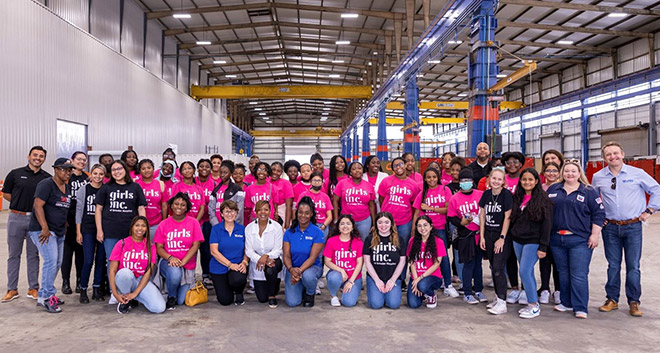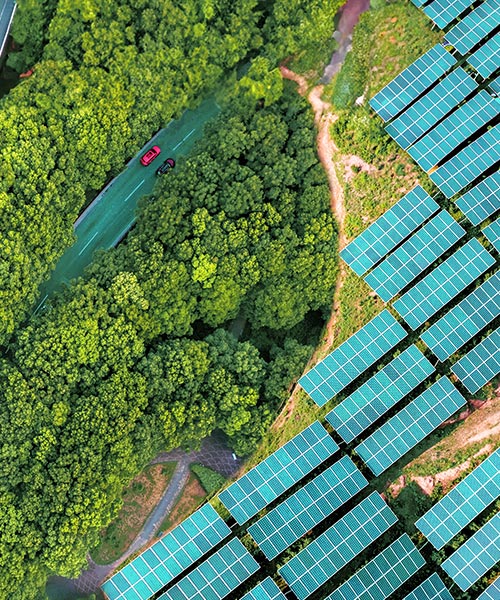
March 08, 2023 • 4 min read
Gender equity: How we’re supporting women in STEM careers
Did you know that globally, only 35 percent of STEM students in higher education are women?
“At Worley, 47 percent of our graduate starters are women,” says Dr Clare Anderson, Director of Sustainability Performance. “This is a significant step forward from 28 percent three years ago, but our goal is to achieve 50 percent.
“The challenge is, how do we get from where we are today, to where we need to be tomorrow?”
“It won’t happen overnight. But inspiring more women to study STEM disciplines and creating work environments where they have equal opportunities to thrive is a good starting point.

Sparking an interest in STEM-related fields
Anderson is also Council Director for the Worley Foundation, which supports local community not-for-profit organizations through financial support and volunteering.
“We’re supporting several charities that help women to engage with STEM during their education. And we want to expand our involvement in these programs across more locations,” she says.
“Our aim is to drive interest and participation for women in STEM from primary school, all the way until the latter stages of their professional careers. And that’s how the Worley Foundation allocates its resources.”
Supporting the FunSTEM program in Nigerian schools

A FunSTEM event in Lagos, Nigeria
As Bosede Oyekunle, Senior Instrument and Control Engineer and Worley’s STEM Ambassador for Nigeria describes, the Worley Foundation is supporting a program to make STEM more accessible to young female students in Nigeria.
“FunSTEM makes STEM fun for school-age children – particularly girls – who tend to be underrepresented in engineering roles when they reach adulthood,” explains Oyekunle.
Oyekunle is an executive member of the Association of Professional Women Engineers of Nigeria (APWEN). She has seen first-hand the historical disparity in female engineers in the region.
“The FunSTEM program addresses the shortcomings of STEM teaching in public schools in Nigeria, which hasn’t always been gender-responsive or engaging to young girls,” says Oyekunle.
But how do you keep this enthusiasm once students start thinking about further education?
Mentoring and guidance for female students in Houston

Girls Inc. of Greater Houston's visit to our Modularization and Fabrication Industrial Hub
The Worley Foundation also supports Girls Inc. of Greater Houston, a non-profit organization.
“Mentoring and careers guidance is vital for high school students,” says Matt Kurtz, Vice President for Project Delivery in Latin America. “Girls Inc.’s initiatives connect female students with professional mentors, who can help them explore new skills. But it’s also about encouraging them to keep the door open to new opportunities.
“We recently hosted 50 girls from Girls Inc. at our Modularization and Fabrication Industrial Hub in Houston,” Kurtz continues. “We explained what a craft career looks like and why their skillsets and perspectives are valuable to the work we do.”
According to Kurtz, achieving greater gender diversity in fieldwork starts with building connections as early as possible.
“If we can create meaningful connections at school, I’m confident we can attract more young women to craft work and engineering. And we can also support them to take on leadership roles.
“The benefits of diversity aren’t limited to the conceptual phase of engineering,” continues Kurtz. “We have complex challenges to overcome in fabrication and construction, too. And a more gender-balanced workforce is critical to our future success.”
Creating a culture for female engineers to thrive

Jamila Alarkan, Project Engineer
The push for gender diversity in engineering and construction doesn’t end at formal education. It’s also about creating a supportive work environment.
“Worley opened the door for me when I came to Australia as a Syrian refugee,” says Jamila Alarkan, Project Engineer in Melbourne, Australia. “I had no local experience, but I was offered an internship.
“Worley saw my potential. I started in the summer vacation program in 2018 and then progressed to a graduate-level role. From there, I moved into a mechanical engineering role and now work as a project engineer.”
Mentorship was key to Alarkan’s successful transition to work life.
“Our leaders have supported me throughout my journey and encouraged me to progress. This is the reason I am where I am today, five years later. My manager, Michael Reeves, has always given me the right opportunities and guidance.
Promoting balance at every level
Mark Brantley, Group President for EMEA, APAC and Project Delivery, HSE & Quality, is also the executive sponsor for the Women of Worley network. He believes gender-balanced teams are important to each project’s success, particularly as companies embark on more ambitious sustainability projects.
“To achieve more gender balance among our project teams, we need to inspire young women to join our industry. We also need to connect them with women in key leadership positions who they can look up to.
“Our customers expect gender balance in their project teams, because they also recognize that a diversity of thought means more innovative ideas to help in delivering a more sustainable world.”



